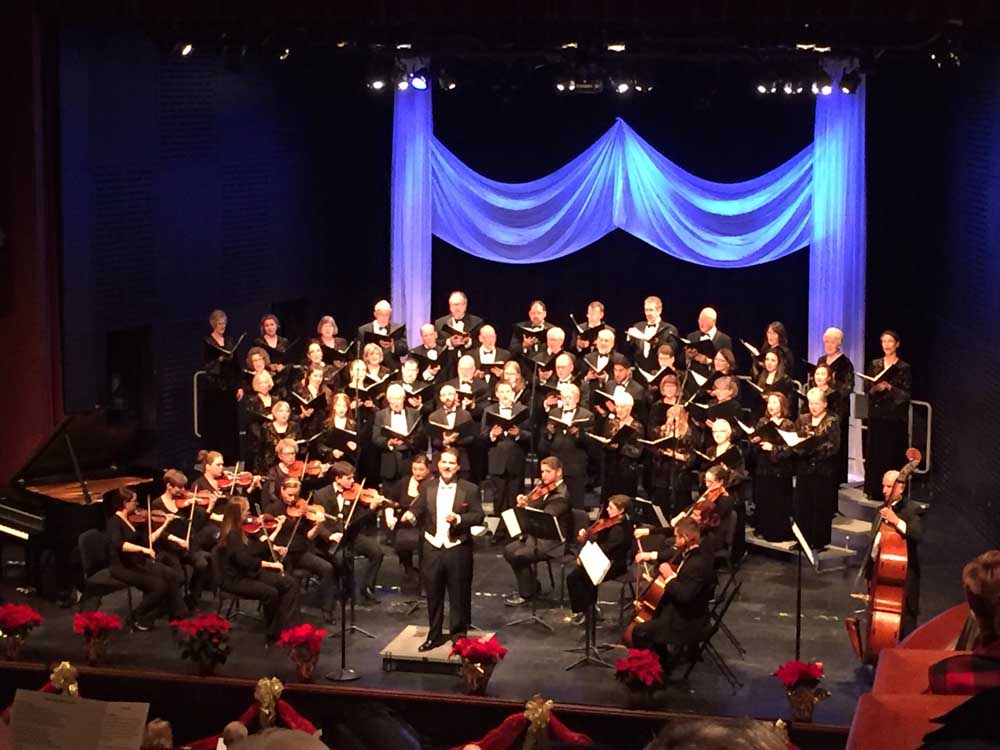Mastersingers to perform in Bend
Published 12:00 am Thursday, April 19, 2018

- Central Oregon Mastersingers performs its annual Christmas concert in this 2017 photo. This year’s Christmas concert includes carols and “Magnificat,” a contemporary work by composer John Rutter.(Submitted photo)
When Central Oregon Mastersingers director Christian Clark was mapping the choir’s 2017-18 season, he decided to kick off the year with current music. That made the program for this weekend’s “Classical Treasures: Choral Gems of the Classical Era” an obvious opposite bookend.
“I tried to plan this whole season at one time,” he said. “Our concert in the fall was primarily, maybe all, contemporary music, modern composers. It just seemed to make sense to balance that with a program of more classical music.”
The concert features the 41-voice Mastersingers joined by a 10-piece orchestra, and includes some extra fun for audience members — more on that below. The group’s regular piano accompanist, Scott Michaelsen, will play organ for a few of the pieces. The music to be performed dates back to the Classical Period of the mid-18th to early-19th century.
Clark, who seems to appreciate order, has organized the program chronologically in terms of when they were composed. Francesco Durante composed Magnificat in B-flat for choir and string orchestra in the 1740s. At least that’s the current thinking. Though it’s a widely recognized piece as 18th-century Italian sacred music goes, there hasn’t always been harmony among experts about whether Durante actually composed it.
“The interesting story about this is that in the early 20th century, the piece became attributed to one of Durante’s students, (Giovanni Battista) Pergolesi,” Clark said. “Throughout the 20th century, including the published music that we are using for this concert, it says that the piece is by Pergolesi. Now we think that it probably really was Durante. In fact, in the 17th and 18th centuries, it was attributed to Durante … a well-known composer of that period.”
Next up is what the Mastersingers are calling a “mixed mass,” Clark said. “We’re pulling selections from a Mozart missa brevis (aka “short mass”) and a Haydn missa brevis. … Each of the works alone are 15 to 20 minutes long.” As conjoined by the Mastersingers, the masses clock in at 16 minutes.
Here’s where some of the fun comes in: Clark doesn’t plan to announce which piece is by Mozart, which by Haydn.
“Throughout the concert (there are) little elements of audience participation,” he said. “We’ll ask the audience at the end of the performance, ‘Do you think the first movement was Mozart, or did that sound like Haydn?’ We might even ask them to keep score in their programs so they can check themselves at the end.”
The concert will continue with two contrasting Beethoven works, the first slow and beautiful, the second loud and bombastic. Then it’s on to a set of early 19th century Schubert pieces “that are just fun to sing, and romantic. And you hear the progression of Classical music.” In the earlier portion of the concert, tempos are more rigid, whereas in the Schubert works, “you start to hear that flex as we’re getting closer to the Romantic period of music.”
Finally, the concert wraps up with a set of Rossini works, including one from one of the composer’s lesser known operas, “Aureliano in Palmira,” and another, “Carnival in Venice,” which Clark describes as a “wild, exciting piece of music.”
In total, the program presented a challenge for the Mastersingers — at first.
“I found it interesting that at the first rehearsal or two, we weren’t accustomed to learning this classical style of music. We were sort of still in the modern, contemporary style with chord clusters and certain tonality,” Clark said.
“It took us a rehearsal to get in gear for this classical music, but once we did, the choir really took to it quickly.”








